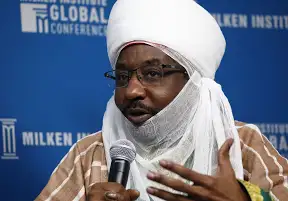
40 KANO DISTRICT HEADS PROSTRATE BEFORE SANUSI, AFFIRM LOYALTY
Malam Muhammadu Sanusi II, the 16th Emir of Kano, presided over the inaugural emirate council meeting on Sunday at the Gidan Rumfa palace.
The former Governor of the Central Bank of Nigeria (CBN), Sanusi’s leadership was reinstated by Governor Abba Kabir Yusuf on Friday.
This first expanded council meeting witnessed the attendance of over 40 district heads and senior traditional council members, who reaffirmed their loyalty to the emir, quelling the ongoing tensions surrounding his emirship.
The formal endorsement of Sanusi’s position was symbolized by the district heads and council members prostrating before him in the palace.
According to reports, 40 district heads and council members prostrated themselves before him, signifying their official endorsement of his position as the rightful Emir of Kano.
Among those that paid homage were the five prominent kingmakers: Madaki, Wali, Makama, Sarkin Bai, and Sarkin Dawaki Mai tuta, alongside other senior figures such as Waziri, Turaki, and Sarkin Shanu.
Sanusi’s reinstatement followed the repeal of a 2019 law that had fragmented the Kano emirate into five distinct regions, a move that initially led to his removal. Governor Yusuf’s approval of the new law paved the way for Sanusi’s return to power.Upon his emergence from the inner palace, riding a white royal horse, Emir Sanusi was greeted with admiration by his subjects. He subsequently engaged with various interest groups, including vigilante units, women’s organizations, and private individuals, who gathered at the palace to express their respect and loyalty.

